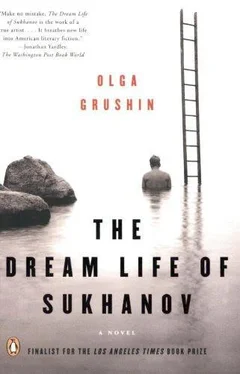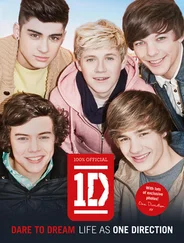During that summer, I became a less frequent presence at Yastrebov’s gatherings: I was too busy working. Lev came less often as well, not so much because of a difference of opinion, but because, as I heard it joked about repeatedly, he was preoccupied with courting some elusive flirt. After our talk that June night, he and I saw each other alone more and more, but I never asked about the girl, and he never told me—which was why in the end I was so unprepared to meet her when one day in early September he brought her to one of our evenings.
She walked into the room—and I would like to say that my friends fell silent or that the room lit up at once—but they did not, and it did not, and everyone but me continued drinking and shouting, and in any case, such stock phrases of a cheap novelist could never explain exactly how I felt when faced with my own perfect vision of beauty. She walked into the room, tall, thin, and graceful, and so young, a flimsy scarf the color of the sea trailing in the air after her, a pair of fluid spiral earrings dangling along her neck, the proud Lev following a step behind. Not in the least put out by the din, the crumpled newspapers, the heaps of records, the empty bottles, she moved through the room nodding to people and shaking hands and smiling as if she had always known them—and suddenly, there she was with her hand outstretched, her green mermaid eyes fully upon me.
“Nina Malinina,” she said serenely. Her hand felt cool in mine, and in my stunned mind, Pushkin’s immortal tribute to his beloved rang out like a clear crystal bell: Chisteishei prelesti chisteishii obrazets. The purest image of the purest charm.
“Malinina?” I repeated, and sensing that she was about to move on and desperate to hold on to her, hurriedly attempted to open a conversation. “Undoubtedly no connection to Pyotr Malinin,” I said, ignoring Lev’s wild signals behind her back, “that pompous old ass whose lectures I had the misfortune of attending at the Surikov?”
Her eyes, as she looked at me, paled to a grayer shade.
“That pompous old ass,” she said quietly, “is my father….”
“Damn,” said a voice from the distant bottom of a well, “he seems rather badly off.”
And another voice shouted, “Hey, someone, go get Borya! She says this old fogey passed out on the floor here is her father!”
A shuffle ensued, and jolted and prodded in several places at once, Sukhanov made an immense effort to raise his heavy eyelids. At first he felt he was drowning in glimmering, shifting milk, but after a while shapes began to emerge, and presently he found his fifty-six-year-old self lying on the carpet in his study, with a few curious faces leaning over him—and among them, amazingly, an eighteen-year-old Nina, her lips twisted with concern, and behind her, Lev Belkin, bright-eyed and disheveled and eternally young, for some reason clutching a guitar and wearing a wine-red tie. Sukhanov stared for a moment, then decided it was better to keep his eyes closed after all and just lie back, letting a familiar voice wash over him in anxious waves.
“Papa, Papa, are you all right?” the voice was saying. “This wasn’t supposed to happen, they were all going to be gone before you got home…. Oh God, I’m so sorry… Boris had this concert scheduled, but then the auditorium fell through at the last minute, and I thought… Papa, can you even hear me? Shall I call a doctor?”
He opened his eyes again. The contours of the universe had grown sharper. Ksenya, not Nina, was bending over him, and behind her knelt an unfamiliar man, still wearing the tie and, true, bearing some vague resemblance to the young Belkin—but not Belkin.
“Papa, please say something!” Ksenya kept repeating.
Sukhanov blinked and looked closer.
“Is… that… my… tie?” he said laboriously.
Her hand flew to her mouth. “Oh no, I forgot about those!” she said. The young man hastily started to tear the tie from his neck. “You see, Boris needed some ties… and by the way, this is Boris, my boyfriend…. He’s written this piece, performance art, you know—”
“‘Song of the Bureaucrats,’ ” pseudo-Belkin explained contritely.
“Shut up,” Ksenya said in a furious whisper, then went on rapidly. “He didn’t mean any harm, he just… just borrowed the ties last Sunday when he stopped by, and I only found out about it tonight. It was supposed to be a joke, see? Of course, he was very upset when I told him about Valya, but don’t worry, we’ll fix it, and the ties are all here, they’re all fine….”
“I spilled some wine on mine,” said someone from the back of the room. “Sorry.”
And suddenly it was all too much, and he was finding it hard to breathe, and pseudo-Belkin was rushing off to throw open a window, and a short-haired adolescent girl—whose name, he somehow knew, was Lina—was pressing a glass of water to his lips, while Ksenya squeezed his hand and repeated helplessly, in a thin voice, “I’m so sorry, it’s all my fault, you’ve fallen sick because of me—”
“Oh, I wouldn’t worry too much about him, it will wear off shortly,” a new voice pronounced jauntily, and the grinning face framed by the salmon-colored scarf materialized in the fog above Sukhanov. Then matters quickly disintegrated into confusion once again. In the hazy distance, he heard Ksenya asking sharp, accusing questions whose essence he could not follow, and the elevator man protesting in an offended patter, then Ksenya shouting, “Grishka, how could you, you bastard!” and a multitude of other voices rising like mist from the edges of the room….
All of this, however, increasingly failed to concern him, for as he continued to look at the elevator man, he saw something wonderful happening—happening slowly but inexorably. An enormous balloon was emerging carefully, gently out of the man’s shaved head. Strangely, no one else seemed to notice, but that did not bother him in the ieast—in truth, it made the moment all the more precious. Once free, the gorgeous yellow balloon hung in the air for one wavering minute, and then with quiet dignity swam through the open window, rose into the skies, and there turned into a most golden, most perfect full moon.
Yes, of course, thought Anatoly Pavlovich with a happy little smile—and floated out the window after it.
For a while he lay without moving. A wide patch of sunshine crept across his face, and from its brightness he deduced that it was late, at least ten o‘clock, perhaps drawing closer to eleven; yet he felt reluctant to open his eyes, enjoying as he was this leisurely moment—a man half asleep, resting in his bed on a Saturday morning (here a needle of unexplained anxiety pricked his heart, but he pushed on stubbornly), yes, resting in his bed, in his freshly laundered pajamas, on a summer morning, as was his right, with nothing in particular to do, and nowhere to go, and a whole pleasant day ahead of him. He was nearly awake, but a few shadowy creatures from a recent dream still scurried about the hazy edges of his memory—and the most nonsensical dream it had been too, involving a misshapen angel in a zoo cage, a man whose head gave birth to an inflated balloon, and a crowd of hippies and rock musicians holding a disreputable concert in his very own living room. Groggily, he marveled that a mind normally so devoid of surprises could be capable of such nightmarish notions.
A telephone began to ring, loud and insistent. After each ring there was a pause just long enough to make him hope it would stop, but invariably the next ring would come, torturously protracted, filling his head with reverberations of the headache he now realized he had. Grumbling, he groped for the nightstand on which the telephone rested, then, not able to feel it, opened his eyes with an effort—and found himself confronted with several truths. He was not in his bedroom but in the living room, crammed painfully between the armrests of a decoratively small couch. He wore a pitiful-looking suit. The air smelled of stale incense, and his mouth tasted as if a small animal had died somewhere inside his entrails. It was no longer morning—the clock on the opposite wall showed half past one; and it was possibly not Saturday either. On the coffee table, next to the screaming telephone, lay a pile of sad remains that on closer observation proved to be his once proud collection of ties.
Читать дальше








![Theresa Cheung - The Dream Dictionary from A to Z [Revised edition] - The Ultimate A–Z to Interpret the Secrets of Your Dreams](/books/692092/theresa-cheung-the-dream-dictionary-from-a-to-z-r-thumb.webp)



